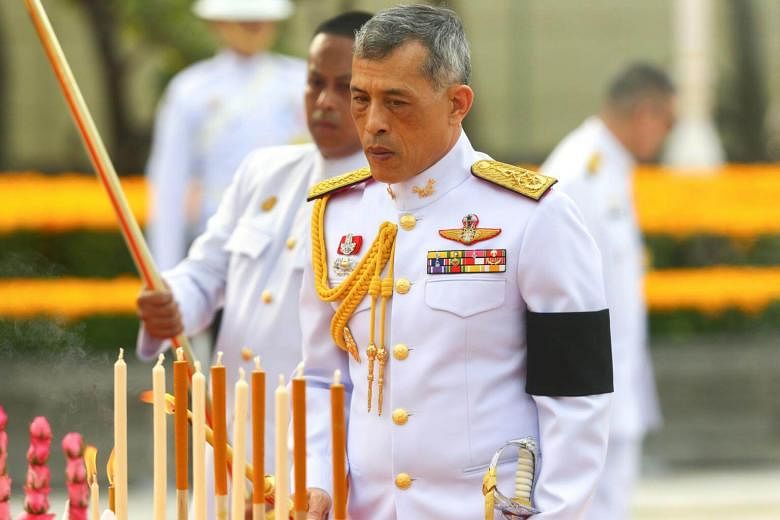BANGKOK (REUTERS) - Thailand's parliament has agreed in a confidential session to transfer control of royal agencies from the government to new King Maha Vajiralongkorn, members of the military-appointed legislature said on Friday (April 21).
The decision came on Thursday in a sitting that was not broadcast in public, they said.
It is another step in giving greater say to the king, who has been reshaping the palace and shown himself increasingly assertive on other fronts.
"It involves the transfer of agencies that work for the monarch so that they are grouped together and report to the king," said one parliament member, who declined to be identified.
The agencies had previously been under the prime minister and defence ministry, he said. Other members of the National Legislative Assembly confirmed the decision, but Reuters could not immediately reach its head, Pornpetch Wichitcholchai, for comment.
The military government declined to comment. The palace does not comment as a matter of policy.
The organisations to be transferred are the Royal Aide de Camp Department, The Office of His Majesty's Principal Private Secretary, the Bureau of the Royal Household, the Royal Guard Command and the Royal Court Security Police, the assembly member said.
"The transferring of these agencies to be under the monarch's direct supervision is another sign of an increasingly absolutist monarch, following the pattern of the new constitution, which similarly was amended to legally enshrine more royal assertiveness," said Paul Chambers, a lecturer at Naresuan University in the northern Thai province of Phitsanulok.
"In addition, placing security agencies under the sovereign's direct control allows him to place those he trusts the most in charge of protecting him."
King Vajiralongkorn inherited the throne last year following the death of his revered father, King Bhumibol Adulyadej, whose reign spanned seven decades and was punctuated by political turbulence.
Thailand is a constitutional monarchy, but King Bhumibol wielded great influence. His son has shown himself to be increasingly assertive with the generals who wrested power from an elected civilian government in a 2014 coup.
In January, he ordered sections of the country's draft constitution to be rewritten - something that hadn't been done by a monarch in decades, and which Thailand's parliament voted overwhelmingly to approve.
He has also been reshaping the palace.
More than 20 notices relating to ninety-six palace staff were published on the Royal Gazette website on March 13, notifying the public of position changes and dismissals - some officials who had served for decades were fired for being "lazy" or "arrogant".
King Vajiralongkorn is widely expected to be crowned at the end of the year following his father's cremation in October.
Political observers say party politics is only likely to happen after the coronation and that a general election will then take place to elect a civilian government to replace the junta.
Aside from a speech in December when he ascended the throne and a televised new year address, much of the new king's rule is a mystery. Few comment on palace affairs given a jail sentence of up to 15 years for anyone guilty of insulting the monarchy under lese majeste laws.
Unlike King Bhumibol, who spent much of his life in the public eye, King Vajiralongkorn has lived much of his adult life abroad, stepping in to perform royal duties in his father's twilight years.

